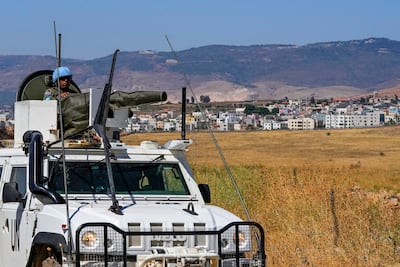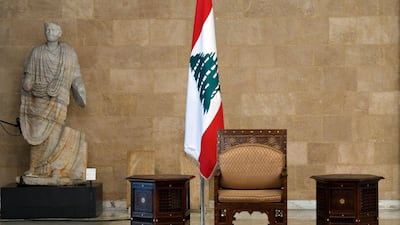Lebanon has been without a president for nearly nine months.
Without a head of state, the small impoverished country has been unable to curb rampant inflation, overhaul its failing energy sector and hold those responsible for the Beirut port explosion accountable, despite more than 200 people dying in the blast.
The political class has also failed to introduce the necessary reforms to pull itself out of one of the worst economic crises in history.
Of course, one could argue that when it did have a president, the country was still unable to solve its numerous interrelated problems.
constitutional law expert
Parliament is supposed to become an electoral body once a president's term is over, with the responsibility of finding a successor.
Constitutionally, in the absence of a president it falls on Lebanon’s government to lead the country.
As MPs soldier on, negotiations behind the scenes to elect a new head of state, the country’s caretaker leader – billionaire Prime Minister Najib Mikati and his 24-member cabinet – has the remit of navigating Lebanon’s political landscape.
But Mr Mikati's government has been met with resistance, with rivals claiming the Prime Minister is overstepping his powers and encroaching on what would be the president’s by holding cabinet sessions, signing decrees and signalling readiness to delineate Lebanon’s national borders with Israel.
What are the president’s prerogatives?
Lebanon’s head of state is the Commander-in-Chief of the army but cannot order it to mobilise without approval from the cabinet.
He (to date Lebanon’s president has never been a woman) can dissolve Parliament but not without the cabinet's agreement.
He can designate a prime minister but only after consulting with the Speaker of Parliament. And so on.
“The president alone can’t do anything,” constitutional law expert Wissam Lahham told The National. “He’s a figurehead.”

Still, due to the confessional make up of Lebanon’s politics, the president – by convention always a Maronite Christian – cannot be marginalised as it would upset a fragile sectarian power-sharing balance.
Because of this, “he has effective political power but he's not the one who leads. In Lebanon, no one really leads,” said Mr Lahham.
Almost as soon as Michel Aoun’s tenure as president ended in October, critics of Mr Nikati began accusing him of usurping presidential powers.
Only this month, leader of the Free Patriotic Movement Gebran Bassil – himself widely thought to be a presidential hopeful – criticised Mr Mikati over the government’s indication to the UN that it was ready to negotiate on Lebanon’s land border with Israel.
"Border negotiations are within the president's powers," Mr Bassil said at the time.

He and his party have also repeatedly boycotted Mr Mikati’s convening of occasional cabinet sessions to run the country’s affairs in the absence of a president or a legislature, on the basis that the government is not fully empowered.
Constitutionally, “when you don't have a president his prerogative is exercised by the Council of Ministers”, Mr Lahham explained – meaning that in the absence of alternatives, Mr Mikati and his government can legally run the country’s affairs, even in caretaker capacity. “It’s as simple as that. But of course it’s better to have a president.”
But the Free Patriotic Movement maintains Mr Mikati is not exercising the constitutional powers of the cabinet legally.
A matter of signatures?
“The president’s primary power that remained after the Taif agreement [1990] was one of signatures: signing off on government formation and on major formal decrees,” said Rindala Jabbour, a spokeswoman for the Free Patriotic Movement.
All cabinet decrees must be signed by both president and prime minister.
Ms Jabbour added: “In the absence of a president a decree must be signed by the prime minister and the full 24 member cabinet” – even when the caretaker cabinet cannot legally meet, by the Free Patriotic Movement’s own argument.
“The foundational disagreement with Mikati is that in the absence of a president he's signing for himself and for the president, and in some cases not even getting the full 24 signatures,” she told The National.
“He is always finding a way to sidestep the 24 signatures.
“Even worse, he is putting his signature twice, on his own line and on the president’s.”
The Free Patriotic Movement’s argument with Mr Mikati is over various high-level decisions that were made without the signature of a president.
“He wants to do whatever he wants and show he has authority to get his decisions passed” by holding cabinet meetings and signing decrees, Ms Jabbour said.
It is a sore point in Lebanon’s confessional politics. Before the Taif agreement that ended Lebanon’s 1975-1990 civil war, the president had more power. The end of the war led to those powers diminishing so the role is more symbolic, while the prime minister – by convention usually a Sunni Muslim – emerged with more substantial prerogatives.
Mr Lahham dismissed the Free Patriotic Movement’s argument with Mr Mikati as “a confessional quarrel for political reasons to gain popularity among Christians by saying we are defending the prerogatives of the Christian president”.
In reality, however, the dispute “is like a smokescreen” for public consumption, Mr Lahham told The National.
“All people think the election of president is a solution to all of Lebanon’s problems. But even if you elect a president, what will change? He has no real power. Would that suddenly make them implement true reforms?”


